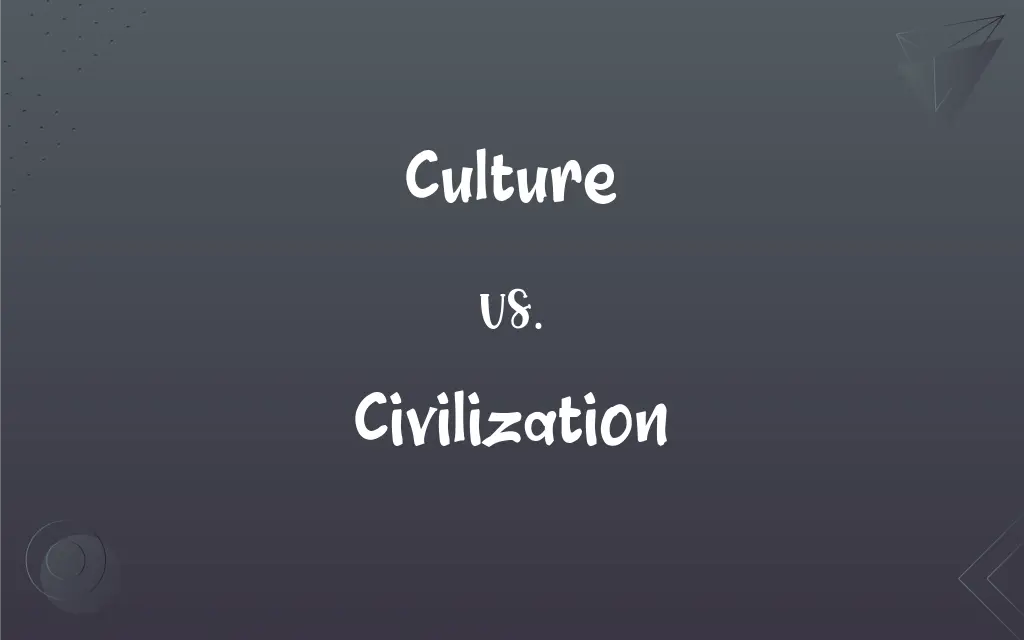Culture vs. Civilization: What's the Difference?
Edited by Janet White || By Harlon Moss || Updated on October 21, 2023
Culture refers to shared beliefs, values, and practices of a group, while civilization denotes a complex society with urban development, social hierarchy, and governance.

Key Differences
Culture encompasses the shared beliefs, values, customs, behaviors, and artifacts that members of a society use to cope with the world and one another. It's the tapestry of shared understanding, beliefs, and practices among specific groups of people. Civilization, on the other hand, refers to a specific type of complex, large-scale society with urban centers, a defined territory, and a structured form of governance. It's a stage of societal development marked by specific advancements.
Within a civilization, multiple cultures can exist. For instance, the Roman Empire was a civilization that housed numerous cultures, each with its own customs, languages, and traditions. On the flip side, a single culture can span across multiple civilizations over time. Culture can be fluid and can evolve based on the influences around it, while civilizations can rise and fall over historical periods.
The concept of culture is more intangible, rooted in things like beliefs, morals, customs, and behaviors. It encompasses art, language, religion, and social habits. Civilization leans towards the tangible, focusing on advancements like writing systems, architecture, and institutions. While culture pertains to the way people think and behave, civilization deals with how societies are structured and organized.
Culture is passed down from generation to generation through teaching, practices, and symbols, ensuring its continuity and evolution. Civilization is characterized by its achievements and advancements in various fields, from engineering and administration to art and governance. While every civilization will have its unique culture, not every culture will have spawned a civilization.
Comparison Chart
Definition
Shared beliefs, values, and practices
A complex, large-scale society with urban centers and governance
ADVERTISEMENT
Tangibility
More intangible (beliefs, values)
More tangible (institutions, advancements)
Scale
Can exist within and across civilizations
Larger societal structure
Continuity
Passed down and evolves over generations
Civilizations can rise, thrive, and fall
Complexity
Focuses on behavioral and intellectual aspects
Includes both cultural and structural advancements
Culture and Civilization Definitions
Culture
The shared beliefs and values of a group.
The local culture is rich in traditions.
ADVERTISEMENT
Civilization
An advanced state of human society with a high level of culture, governance, and infrastructure.
The ancient Indus Valley civilization was known for its urban planning.
Culture
Artistic and intellectual achievements and expressions.
The city is known for its vibrant arts and culture scene.
Civilization
The process by which a society reaches an advanced stage of social development.
The rise of writing is a hallmark of early civilization.
Culture
The customs and behaviors of a particular group.
Culture plays a significant role in shaping identities.
Civilization
The comfort and convenience of modern life, regarded as available only in towns and cities.
After weeks in the wilderness, they missed the comforts of civilization.
Culture
The attitudes and behaviors characteristic of a particular social group.
Company culture is crucial for employee morale and productivity.
Civilization
A society's particular way of life and its cultural, technological, and social achievements.
The Mayan civilization built impressive pyramids.
Culture
A way of life of a group of people.
Traveling exposes you to diverse cultures around the world.
Civilization
The collective societies and cultures of the world.
We must promote peace and understanding among all the world's civilizations.
Culture
The arts, beliefs, customs, institutions, and other products of human work and thought considered as a unit, especially with regard to a particular time or social group
Edwardian culture.
Japanese culture.
Civilization
An advanced state of intellectual, cultural, and material development in human society, marked by progress in the arts and sciences, the extensive use of record-keeping, including writing, and the appearance of complex political and social institutions.
Civilization
The type of culture and society developed by a particular nation or region or in a particular epoch
Mayan civilization.
The civilization of ancient Rome.
FAQs
Can a society have culture without being a civilization?
Yes, even small, non-urban societies can have rich cultural traditions and values.
How is culture transmitted?
Culture is transmitted through language, symbols, rituals, practices, and education from one generation to another.
What is civilization?
Civilization refers to a complex society with advanced development in various areas like politics, economics, technology, and culture, usually marked by the presence of cities, a structured government, and often, written language.
What is culture?
Culture refers to the beliefs, values, customs, arts, and other elements that characterize a particular society or group.
What are the key components of civilization?
Some components include urban centers (cities), a centralized government, organized religion, specialized job roles, and advanced technologies.
Is there a universal culture?
No, culture is diverse and specific to groups, though there are some universal human experiences and elements shared across cultures.
What role does language play in culture?
Language is a key vehicle for expressing cultural values, stories, and traditions, helping to shape and preserve cultural identity.
Is civilization always considered progress?
Not always. While civilizations often bring advancements, they can also lead to problems like social inequality, environmental degradation, and loss of cultural diversity.
What is cultural relativism?
Cultural relativism is the idea that one should understand and evaluate another culture based on its own values and beliefs rather than imposing one's own cultural standards.
Are there stages in the development of a civilization?
Historians and anthropologists often identify stages, such as nomadic, agrarian, urbanization, and industrialization, but the progression isn't uniform for all civilizations.
Are culture and civilization the same?
No, culture is about the ways of living and thinking of a group, while civilization refers to the broader societal structures and advancements.
How has culture evolved over time?
Culture evolves due to factors like environmental changes, technological advancements, migrations, and interactions with other cultures.
How do civilizations decline or fall?
Civilizations can decline due to various reasons: environmental disasters, warfare, internal strife, economic collapse, or a combination of factors.
Why is understanding culture important?
Understanding culture aids in effective communication, collaboration, and appreciation of diversity, fostering mutual respect and understanding.
Can culture change?
Yes, cultures are dynamic and evolve in response to internal and external influences.
Can a civilization consist of multiple cultures?
Yes, many civilizations are multicultural, with diverse groups coexisting and influencing each other.
How does culture influence behavior?
Culture provides a framework of beliefs, values, and norms that influence how individuals think, act, and interact within society.
How do trade and communication impact civilization?
Trade and communication promote the exchange of ideas, goods, and technologies, leading to growth, innovation, and often, increased complexity in civilizations.
How do arts and literature reflect culture?
Arts and literature often depict, challenge, or celebrate societal values, beliefs, and experiences, providing insight into the cultural fabric of a society.
What are cultural symbols?
Cultural symbols are objects, signs, or images that represent particular meanings or ideas within a specific culture.
About Author
Written by
Harlon MossHarlon is a seasoned quality moderator and accomplished content writer for Difference Wiki. An alumnus of the prestigious University of California, he earned his degree in Computer Science. Leveraging his academic background, Harlon brings a meticulous and informed perspective to his work, ensuring content accuracy and excellence.
Edited by
Janet WhiteJanet White has been an esteemed writer and blogger for Difference Wiki. Holding a Master's degree in Science and Medical Journalism from the prestigious Boston University, she has consistently demonstrated her expertise and passion for her field. When she's not immersed in her work, Janet relishes her time exercising, delving into a good book, and cherishing moments with friends and family.
































































